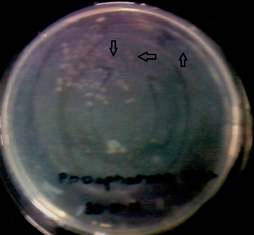Some free living microorganisms in soil have the capability to produce phosphatase. This enzyme is able to mineralize organic phosphates into inorganic phosphates that provides high Phosphorus for plant. But it has been found to be not an easy technique for isolating them specially for students in a microbiology laboratory within a short time in his/her course. An easy method was used in this experiment with reliable result and repeatability to obtain the most excellent bacterial isolates producing phosphatase.
Principle
Phosphates producing bacteria can split ester phosphatase. To isolate such phosphatase producing bacteria from soil properly diluted sample could be plated on a media contain Phenolphthalein phosphate. Phosphatase producing colonies could be detected by exposing them to ammonia vapour.
Requirements
• Soil samples,
• Sterile distilled water,
• Sterile petri dish, pipettes and tubes
• Nutrient agar containing Phenolphthalein phosphate
• Spirit lamp, inoculating loop.
Procedure
1) Phenyl phosphate agar medium was prepared by adding 1ml of 1% solution of Phenyl phosphate to 100 ml of nutrient agar.
2) Properly diluted soil samples were plated and plates were incubated for 24hrs at 37°C.
3) Ammonia vapour was produced by mixing dry powdered ammonia chloride with about twice its weight of dry slacked lime Ca(OH)2 in a mortar, take the mixture in a hard test tube and heat carefully.
4) Phosphatase producing colonies were detected by exposing them to ammonia vapour.
Observations
On exposure to ammonia vapour the phosphatase producing colonies turned pink.

Arrows indicating pink colonies.
About Author / Additional Info:
I am currently working as a Assistant Professor in Biology and as Head in the Department of Microbiology, St.Paul’s, Cathedral Mission College, Kolkata